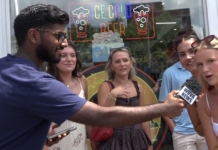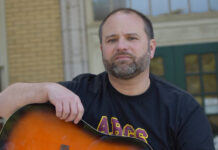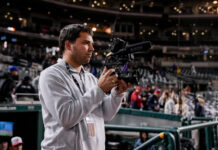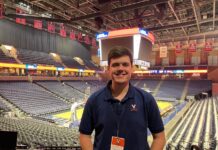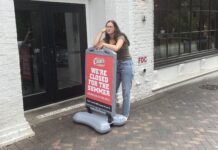In light of the uptick in anti-Asian hate crimes throughout the country, we felt that the UVA community would benefit from hearing the voices of their fellow Asian American Hoos.
To that end, we asked a diverse group of Asian American students about their personal stories, their experiences as Asian Americans, and their responses to the anti-Asian violence that has shaken many in this country. Let them introduce themselves to you:
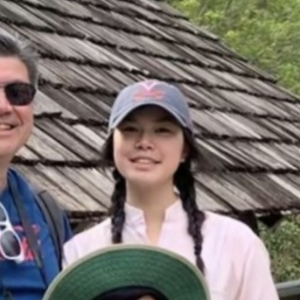 Hi, my name is Ariane Tiongco! I’m a second year incoming McIntire student also minoring in Japanese.
Hi, my name is Ariane Tiongco! I’m a second year incoming McIntire student also minoring in Japanese.
I am a member of the Organization of Young Filipino Americans (OYFA), a CIO dedicated to sharing Filipino culture, and an analyst of the McIntire Investment Institute. I am also a volunteer for the Madison House CASH Program, where I help clients in marginalized communities in Charlottesville file their tax returns.
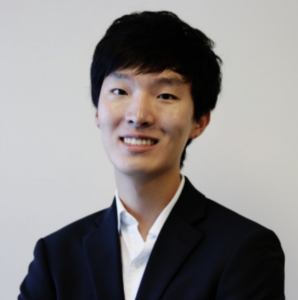 Hi! My name is Sam Kim, and I’m a fourth year at the University of Virginia majoring in computer science.
Hi! My name is Sam Kim, and I’m a fourth year at the University of Virginia majoring in computer science.
Right now, I am in a Christian fellowship called Chi Alpha and planning on working for Booz Allen Hamilton as a software engineer.
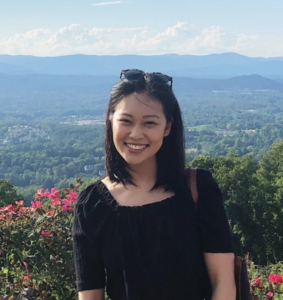
Hi, my name is Alyce Hong! I’m currently a second year Computer Engineering major, and I want to go into either software development or project management.
I’m currently involved in Alpha Omega Epsilon, an engineering sorority, and I plan a sorority-wide bonding event called Day Away each semester. I am also a core group leader in Chi Alpha Christian Fellowship.
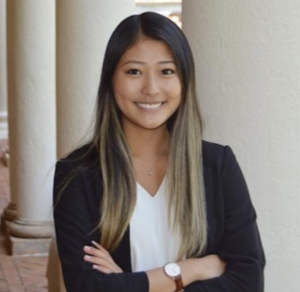 Hi, my name is Kayla Kim and I’m currently a second year at UVA studying computer science. I’m part of a couple business clubs at UVA including Alpha Kappa Psi, Global Markets Group, McIntire Investment Institute, and Virginia Finance Institute.
Hi, my name is Kayla Kim and I’m currently a second year at UVA studying computer science. I’m part of a couple business clubs at UVA including Alpha Kappa Psi, Global Markets Group, McIntire Investment Institute, and Virginia Finance Institute.
I’m also a tax volunteer for CASH and a part of the Outdoors Club.
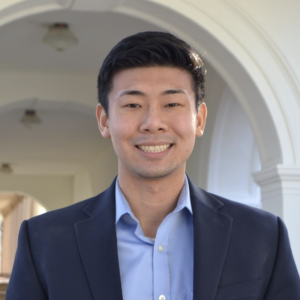
Hi, my name is Arnold Leigh. I’m completing a BS in Biology this semester and will be working at the NIH next year conducting stem cell research at the National Eye Institute.
For the past two years and a half, I’ve been involved with medical research at UVA. Before COVID, I was involved with Madison House in the Bridging the Gap program. I’m also a member of the Virginia Alpine Ski and Snowboard Team (VASST).
Tell us about yourself and your family.
Kayla: I was originally born in South Korea, but my family immigrated to the US when I was about 10 months old. I grew up in suburbs in the northern part of Virginia and currently live in Chantilly, Virginia. After college, I plan on pursuing a career in finance.
Alyce: My parents raised my sister and me by giving us every opportunity they could. With these opportunities, we were always allowed to decide on what we wanted to do or not do. We always had the final say in what we chose and that put a mindset of responsibility in both of us. It was a very happy upbringing, always busy with different activities, and traveling a lot.
Ariane: My parents immigrated from Manila, the Philippines about 30 years ago to find work and raise my large family of 5 kids and a dog. I am grateful to have had a very loving and comfortable upbringing.
My parents focused my upbringing on assimilation into my American peer group as a way to fit in and not feel the “burden” of being a minority child of immigrants. However, I am grateful to them for maintaining my culture. Many of my fond childhood memories revolved around gorging myself at Filipino parties where hosts and guests brought a smorgasbord of meats, noodles, and other tasty dishes, then playing sardines with the kids.
At UVA, joining the OYFA (the Organization of Young Filipino Americans) has given me the connection that I have longed for.
Arnold: I am Korean American and I’m from McLean, Virginia. I have two brothers, one older and younger. My older brother was born in South Korea and then moved to America with my parents at a young age.
Sam: I immigrated with my family to Northern Virginia from Seoul, South Korea. As the stereotype suggests, my parents were quite strict when I was younger.
What does the Asian American experience mean to you?
Kayla: To be an Asian American means to me that I was able to experience 2 different cultures growing up. My immigrant parents still barely speak English today and our family has been able to hold onto many Korean traditions even though I’ve basically lived my entire life in the United States. On the other side, I’ve been able to experience American culture by growing up in America. I’m grateful for all my parents have done to get me to where I am today, and I have a lot of appreciation for all of the opportunities and experiences I’ve had.
Alyce: I was born and raised as a Korean American in a majority white neighborhood in Northern Virginia. My sister and I would go to Korea to spend entire summers there to learn about the culture, language, and daily life.
I didn’t grow up with many other Asians around me so a lot of times other kids around me would be like “What kind of Asian are you?” The automatic follow up would always be “Chinese? Japanese?” and no one would really ever say Korean. Once I responded by saying Korean, the response would be “Oh, North or South?” I truly think at that age, these kids really did not know any better. So they were just going off of the little that they knew about Asia and the Asian community. But I truly believe that people can educate themselves throughout life to not say these types of things, which can be offensive to many.
There were a lot of times where I didn’t know which space was where I belonged, which space felt more comfortable, since it didn’t feel like I fit in either. When I used to say, “I listen to Korean music and watch Korean TV,” a lot of the people around me at school would tell me how Korean I was. But then when I went to more predominantly Korean spaces, my mannerisms were always more “American” than my peers. But due to my parents’ efforts to keep us in touch with our Korean heritage while we were young, I can say that it really doesn’t matter what space I thought I had to be in.
Which is why I like to say that I’m Korean-American, because although I am American, I’ve grown up in America, I still have my roots and heritage in Korea.
Ariane: Since my parents focused most my rearing on assimilation rather than absorbing my own culture, I find myself aligning much with the experience of white students in a sense. I carry similar memories, outlooks, and even privileges that I have recently become aware of this past summer. Regardless, I still identify as Filipino/Filipinx since by blood I carry the rich history and culture of the Philippine people despite the lightness of my skin and my lack of accent.
However, I feel that being Asian American inherently carries an internal struggle of identity in which you can relate to and feel similar passions as members of mainstream American society, but still feel alienation – not being “enough” or “whole”. Thus, many of us carry the insecurities of being called “white-washed” or “chinky” or “banana,” where the weight of a split identity brings forth an internal crisis.
Otherwise, being Asian-American has its perks, as you get to enjoy the rights of being an American citizen, having a home in such a free and opportunity-rich country, as well as being culturally nuanced with a plethora of delicious foods, facts, dances, clothes, etc.
In summary, as with all people who have their own identity, being Asian American has its ups and downs. While you get pretty awesome food and fashion sense (not haircut tho: omg the bowl), there’s always the weight of identity crisis and alienation by others.
Even if you surround yourself with people that are Asian American, everyone comes from a different background/country and has a different take. Every Asian-American identity/experience is ours to be proud of as well as to contemplate at times.
What has your UVA experience been like?
Kayla: My experience at UVA has been relatively positive. I’ve been able to meet amazing people throughout all my classes and activities that I’m involved in. Personally, I haven’t really experienced any negative sentiments towards me because of my ethnicity. However, I recognize that I am lucky to be able to say so in light of recent events.
Sam: At UVA, it has not been easy. There were moments in my life when I wanted to be the token Asian kid amongst the white kids. But as the only Asian resident in my house, I have been pummeled with questions and comments when eating Korean food. Furthermore, I had only one friend who asked me how I was doing in the light of the recent attacks. It really meant a lot, but I wish more people in my “inner circle” would have asked me how I was doing.
Alyce: UVA is another predominantly white institution, and most of the professors are Caucasian. I’m sure that many Asians at school can relate to this, but there have been multiple times where I’ve been confused for another Asian female. I doubt there’s ever harmful intent in confusing names, but it happens so often. There are times when I wonder why my professors can get most other students’ names correct, but seems to just confuse Asians.
I had this experience with my landlord a month or so ago, because there is one other Asian female that lives with me. When he was told that he didn’t get my name right, he responded by saying, “At least I was half right.” It truly baffles me that people in Charlottesville have the audacity to respond in that way instead of being apologetic.
Ariane: Being a UVA student has been pretty great so far. I’ve joined some really cool clubs, met amazing and inspiring people, learned some valuable skills, and taken some fire classes.
Although I have been blessed to not be the victim of any hate-induced violence, I still feel the pressures of microaggressions in this relatively white-dominated school. For example, some people ask where “I really come from” and talk about having “yellow fever” — a fetish for Asian women. These situations have made me feel uncomfortable and even fearful of being in a place where I rightfully belong as a UVA student.
In light of the recent attacks on Asian Americans throughout the country, what has UVA done well and what can UVA do better to support the Asian American community?
Kayla: I appreciate UVA bringing awareness to this issue through various emails and articles and I think it’s important to understand that UVA cannot control the actions of its faculty and its students on a day-to-day basis.
Nonetheless, I do feel that the administration could do more in speaking out against the recent attacks and the general sentiment around Asian Americans, or even just expand upon certain actions they have already taken.
For example, CAPS has added more services to better serve the Asian American community this year. This is great, but I feel like no one knows about this and there needs to be better outreach.
I feel that few know about the history of Asians in America and where the hatred towards Asians in America really comes from. Encouraging education on these topics would be useful, whether through professors or guest speakers. At the end of the day, emails are a great starting point but don’t necessarily encourage any change.
Alyce: As a community, UVA gives students space to speak, which I appreciate. Many student organizations have expressed their stance. There was a student organized candlelit vigil that many attended. Dean Groves sent out an email mourning the lives lost in Atlanta, and many faculty have done the same. It’s a step in the right direction by acknowledging the experiences of Asian Americans.
To better support the community, I hope that UVA will continue to foster conversations about the Asian American experience and create spaces where Asian Americans can continue to feel safe.
Ariane: The biggest thing I wish UVA could do to support not just the Asian American community, but all minority student communities and C’ville residents is to establish behavioral standards for all UVA students: a standard that racism, implicit or explicit, is never acceptable under any circumstance and will be subject to proper consequences.
Also, it’s really the little things, such as housing, scholarships, variety of professors, jobs offered by UVA, etc., that feed into the bigger issues of race and need to be brought into the spotlight. Then we will truly be on our way to building a UVA environment that students feel safe in and proud to be part of.
Arnold: I think UVA has done a fine job about the Asian American talks through raising awareness with emails. UVA could better help the Asian community by better educating the school population on what’s going on and Asian American culture.
What changes in society do you hope to see long-term with regards to Asian Americans?
Alyce: Hate crimes are horrific. I hope and pray that people are able to simply acknowledge the Asian community and their experiences in the United States. A lot of times, I think this is a community that gets overlooked. As a community, we don’t always speak up for the injustices that we face. But when we do speak, I hope that society can hear our voices, acknowledge our voices, and join us in speaking up for what is right.
Kayla: I hope that more awareness of this issue will invoke more understanding, and that society as a whole will shift its perspective towards Asian Americans.
Ariane: Racism is not a new concept or something that just applies to this year. It has been carried down in history and into institutions, but we as the new generation of people must deconstruct and expose and fix it.
Change your mindset to acknowledge what you, personally, have done in the past that would not fly today. Don’t try to showboat your solidarity and advocacy for another race. Instead, become a listener and educate yourself so that when you notice a microaggression pop up in your workplace or within your friend group you can stand up in a respectful manner.
Other than that, try to appreciate other cultures’ foods. Food is the best way to get to know people and culture, because nothing brings together people like a meal!
Arnold: In response to the recent attacks, I hope that American society changes its negative perception and behavior to not just Asian Americans but all other races as well. It’s really sad to witness how other people are treating elderly Asian Americans.
Author’s note:
On behalf of the UVA Asian American community, we as the writers of this article would like to thank you for taking the time to read this article and hear the voices of members of our community. The individuals here shared the details of their backgrounds, and some opened up about their challenges fitting in, feeling valued, and dealing with the rise in violent hate crimes against the Asian American community. We hope that by working together to understand and accept each other, we can not only create a better UVA experience for all students, but also help shape a world where people of all backgrounds are equally valued and respected.
If you are further interested in learning more about the Asian American experience, both at UVA and in general, we encourage you to read Professor Sylvia Chong’s article ‘A Race So Different.’ Another great resource and perspective is this ESPN Daily podcast featuring Jeremy Lin and Pablo Torre, in which they discuss Asian American identity and racism.
If you or someone you know may be interested in seeking counseling resources, please consider scheduling an appointment with UVA’s Counseling and Psychological Services (CAPS). Please visit their website or call (434) 243-5150 to schedule an appointment.







